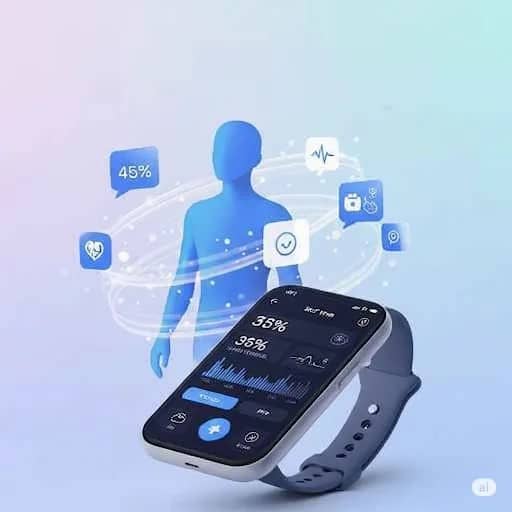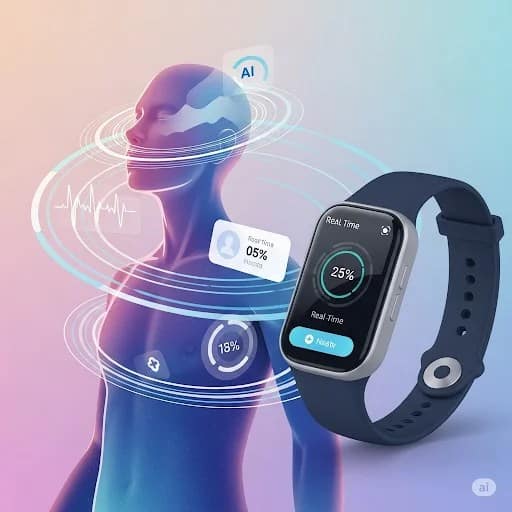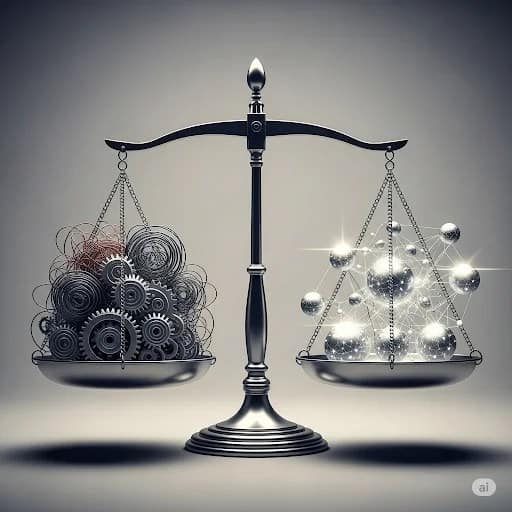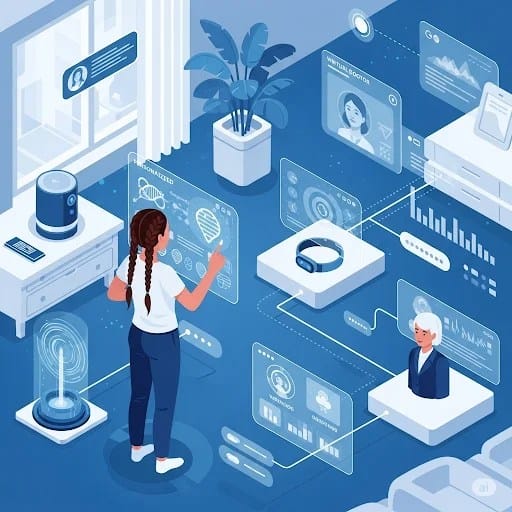AI-for-Her
AI women’s health: In today’s fast-moving world, our phones have become essential tools for almost everything. Now, AI women’s health apps are changing how women manage their health. For a long time, women’s health issues often faced challenges. Sometimes, research didn’t include enough women. Other times, it took a long time to get a correct diagnosis. Also, healthcare often treated everyone the same, not considering how women’s bodies are different.
But now, Artificial Intelligence (AI) in phone apps is making things better. These apps give women personal health advice and help them take charge of their well-being. They make healthcare easier to get and more effective. This article will explain how these AI women’s health apps are making a big difference.

We’ll look at how they help with everything from reproductive health to finding problems early, and even with mental well-being. This new way of using AI is bringing a better, fairer healthcare experience for women everywhere.
Smarter Ways to Find Health Problems Early
One of the biggest impacts of AI women’s health apps is their ability to help find health problems much earlier. Old ways of finding health issues could be slow or sometimes not accurate enough. This was especially true because women’s symptoms can sometimes show up differently than men’s. AI programs are changing this. They can look at huge amounts of data and spot small patterns that humans might miss. This makes healthcare faster and more accurate.
Think about breast cancer, which is a common cancer among women. AI tools are making a huge difference here. AI women’s health apps can work with imaging machines to check mammograms very closely. These AI tools learn from looking at thousands of past medical images. They can find tiny unusual spots that a human eye might not see.

Here are some key ways AI helps find problems early:
- Better Image Checks: AI programs can look at medical images like mammograms much more accurately than humans. They find small things that might be missed otherwise.
- Spotting Patterns: AI can look at lots of different health information. This includes symptoms, past health, and data from smart devices. AI uses this information to find hidden patterns that show a risk.
- Fewer Mistakes: AI helps make sure fewer mistakes happen in diagnosis. This means women get the right follow-up care faster.
- Easier Check-ups: In rural areas or places without many doctors, AI tools can help with quick checks. This makes it easier for everyone to get screened early.
- Predicting Risks: AI can tell who might be at a higher risk for certain problems even before they feel sick. This helps people take steps to prevent illness.
Your Personal Health Guide: Smart Care and Predictions
Imagine having a health guide that knows just you. That’s what AI women’s health apps are becoming. They understand that every woman’s body and health journey are special. So, AI programs don’t just give general advice. They give personal health tips and plans that fit you perfectly. This move away from “one-size-fits-all” is a huge part of what makes AI so powerful in healthcare.
For example, in reproductive health, AI women’s health apps are completely changing how women keep track of their periods. These apps also help predict when women can get pregnant. Apps like Flo, Clue, and Ovia Fertility use AI to analyze many different things. They consider your daily body temperature, your past period history, and any hormone changes you track. Your lifestyle habits are also included in their analysis.

Here are the main ways AI offers personalized care:
- Exact Fertility Predictions: AI looks at your personal cycle data. It can guess your ovulation and fertile window very accurately. This is true even if your periods are not regular.
- Custom Pregnancy Support: AI checks your pregnancy data from smart devices and records. It flags risks early and gives you personal advice during pregnancy.
- Individual Symptom Help: For issues like menopause, AI processes your hormone data. It also evaluates your lifestyle information. These insights help suggest personal ways to deal with symptoms.
- Tailored Diet and Exercise: AI apps can suggest meal plans and workouts. These plans are best for your body and can even fit with your period cycle.
- Proactive Health Insights: By learning your unique body patterns, AI can guess future health trends. It can then suggest ways to prevent problems before they start.
Help for Your Mind and Daily Life
AI women’s health apps aren’t just for physical problems. They’re also becoming very important for mental health and helping with daily life. We know that our physical and mental health are connected. AI offers ways to help many women. It is particularly beneficial for issues that affect them more often. These issues aren’t well-served by traditional doctors.
Mental health support is a big area where AI is truly helping. Women often face unique mental health challenges like sadness after childbirth, anxiety, and stress. These can be made worse by daily pressures and hormone changes. AI tools, like chatbots and virtual therapists, are changing how women get help.
These AI programs understand language and can talk to you. They offer private and personal support, guided exercises, help you track your mood, and provide ways to deal with stress. They are often available 24/7. This helps get rid of common problems like embarrassment about seeking help, high costs, or not having a therapist nearby. It makes it easier to get help early and keep getting support.
Also, AI women’s health apps can give daily life tips. These tips are made just for you. They are based on your body’s cycle. For instance, apps like Moody Month use AI to provide daily wellness tips. They help you track your mood based on your hormone cycle. The app observes how hormones affect your mood, energy, and cravings. It then gives you personal advice on what to eat. It also advises how to exercise and how to relax. This helps women make choices that fit their body’s natural rhythm, making them feel better throughout their whole cycle.
Facing Challenges and Thinking Ethically
Even though AI women’s health apps offer so much, there are still big challenges. We need to make sure these apps are used widely and fairly. Dealing with these issues is key to building trust and making sure AI helps everyone as much as possible.
One of the main challenges is data bias and representation. AI programs learn from the data they are given. Historically, medical research and the data collected have often focused more on men. This has created a “gender data gap.” If AI models learn from data that isn’t fair, they might continue existing unfairness in healthcare. The data also needs to include enough diverse women. This means women of different races, ages, social backgrounds, or specific health conditions.

They could even give wrong diagnoses or advice for women. This is very serious, especially for conditions where symptoms are different in women or haven’t been studied enough. We must make sure AI models learn from varied and complete data that includes all women. This is how we make sure the solutions are fair and work well.
Data privacy and security are also huge concerns. AI women’s health apps often collect very private health information. This includes details about reproductive health, symptoms, and lifestyle. It’s absolutely vital to protect this information from being hacked or misused. Apps must also follow strict rules about data protection, like GDPR and HIPAA (and similar laws in India). Users need to trust that their private health information is safe and used properly. Being clear about how data is collected, used, and shared is key to building and keeping that trust.
The Bright Future of AI in Women’s Health
The future for AI women’s health apps looks incredibly promising. New inventions are coming that will keep changing women’s healthcare for the better. We’re moving towards even more connected, predictive, and preventive care that is tailored just for you. This will go beyond what traditional healthcare usually offers.
One major future step is how AI will work even more closely with smart devices for continuous health tracking. Imagine a smartwatch that tracks your fertility. It also spots small changes in your body. These changes could mean early signs of problems like gestational diabetes during pregnancy. They might also indicate the start of menopause. It would give you real-time alerts and advice. This constant stream of body data, looked at by smart AI, will lead to truly personal and preventive health management.

The growth of AI-driven virtual health helpers and online doctor platforms will also make healthcare much easier to get. These smart helpers will become even smarter. They will not just give information. These helpers will assist you in figuring out your symptoms. They will smoothly connect you to human doctors when needed. This will be very helpful in rural areas or places where it’s hard to find specialized women’s health services. In the future, AI might even help with remote diagnoses, meaning fewer trips to the doctor’s office.
Comparing Old Ways vs. Smart AI Apps for Women’s Health
| Feature | Older Women’s Health Apps (Without AI) | AI Powered Women’s Health Apps |
|---|---|---|
| How Data is Looked At | These apps use simple rules, for instance, like calendar math, and thus offer limited pattern finding. | In contrast, smart programs and machine learning actively find deep patterns across many types of data. |
| Personal Touch | Personalization is quite basic; consequently, it’s often based on averages or only what you type in. | Conversely, it’s very personal; indeed, it learns from your body and therefore gets better over time. |
| How Accurate Predictions Are | Accuracy is often just okay; as a result, predictions can be wrong for irregular cycles. | However, accuracy is very high; consequently, it constantly improves predictions based on your data. |
| Finding Problems Early | Early problem finding is limited; furthermore, it depends heavily on you noticing symptoms. | Conversely, it’s much better; as a result, it can spot small changes and possible risks before you do. |
| Advice & Tips | You typically get general advice, and then you log symptoms yourself. | However, it offers personal tips and, specifically, advice for daily life, food, exercise, etc. |
| Where Data Comes From | Data mostly comes from what you type in manually; additionally, there’s basic sensor data. | It uses your input, plus smart devices (like temp, heart rate, sleep), and potentially medical records or genes. |
| Mental Health Help | You get basic mood tracking and also simple information. | Instead, it offers AI chat help, furthermore, personal exercises, and actively checks mental health. |
| How Easy to Get Care | Access is typically through a phone app. | Consequently, it provides easier remote care and thus, smart helpers, helping people far from doctors. |
| How Complex Problems Are Handled | It handles simpler problems and provides basic tracking. | Moreover, it handles complex patterns and long-term health issues, since it looks at many factors. |
Conclusion: New Tech, Stronger Women
AI women’s health apps mark significant progress, fundamentally changing healthcare for women. These apps make healthcare easier to access, personalize it, and improve it for women. These clever apps actively break down old barriers. They offer amazing insights into each woman’s health journey. They also provide tools to actively manage many health worries.
AI offers revolutionary ways to find diseases early and helps create truly personal care plans. It also provides great mental health support and smart predictions. AI truly revolutionizes how women take care of themselves.
As this technology keeps improving, AI’s role will become even more connected and smart. With diverse data, it will become a powerful tool. A strong focus on ethical use will help every woman control her health and thrive.
Call to Action
Ready to take charge of your health? Then, explore how AI women’s health apps can give you personal insights and support for your unique health journey. Indeed, start empowering your well-being today!
Short Disclaimer: This article gives general information about AI-powered women’s health apps. Always talk to your healthcare provider for personal advice and for any specific health concerns.
Discover more from I-PICKS
Subscribe to get the latest posts sent to your email.



1 thought on “AI women’s health: Smart Health in Your Pocket?”